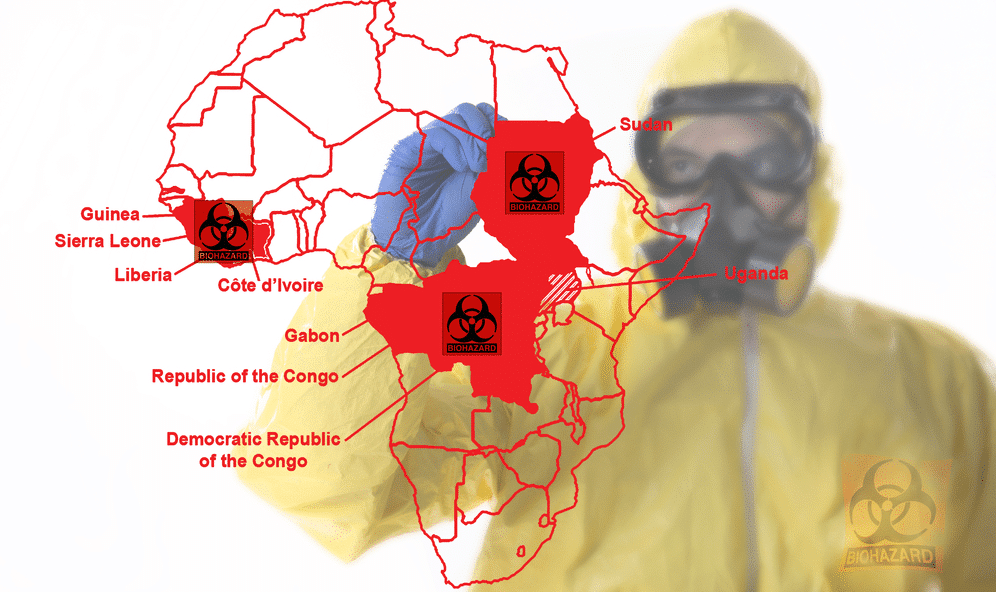EBOLA

WHAT IS EBOLA ?
Ebola is a severe viral disease. It is transmitted through direct contact of the skin and of the mucous membranes (of the eyes, the mouth and the nose notably) with the blood or with the body fluids of an infected person, alive or dead. Body fluids include saliva, sweat, vomit, semen, breast milk and feces. Direct contact with medical supplies, such as needles and syringes, which have been used to treat a contaminated person, can also result in the transmission of the disease. Animals, like primates and bats, can carry the Ebola virus and may transmit it to humans through close contact, as well as through their raw or under cooked meat.
The symptoms of Ebola include a sudden fever, severe headaches, muscular pain, extreme body weakness, vomiting, diarrhea and stomach pain. Unexplained bruises, as well as internal and external hemorrhages can also occur. In most of the cases, Ebola is fatal.
WHO IS AT RISK FOR EBOLA ?
The Ebola virus is present in Africa. The persons traveling to an infected country can be at high risk for Ebola if they are in close contact with contaminated people, alive or dead. This is especially the case of the travelers visiting infected relatives or friends.
The health workers operating in a country at risk are extremely threatened by Ebola, as they are constantly in close contact with victims of the disease. It is essential that the medical professionals follow drastic measures to protect themselves against the virus, like wearing adequate personal protection equipment, such as hospital gowns, gloves, masks and protective eye wear.
HOW CAN TRAVELERS PROTECT THEMSELVES AGAINST EBOLA ?
There is currently no vaccine or specific treatment against Ebola. If you intend to go to a country affected by the disease, the first recommendation is to cancel or to postpone your trip if this one is not essential. If this is not possible, you must make sure that you are fully covered by a good health insurance, including evacuation and repatriation, while you are traveling in countries at risk for Ebola. Once arrived in an infected area, always follow the recommendations of international health organizations and of local health authorities to avoid being infected with the virus.
- Always have good hygiene practices and frequently wash your hands with clean water and soap, or with an alcohol-based hand sanitizer.
- Avoid any contact with the blood or with the body fluids of people infected (or suspected of being infected) with Ebola. Don’t approach the bodies of persons who died of Ebola and never attend any funeral ritual.
- Never handle items or touch surfaces that may have been contaminated by a person infected with Ebola.
- Never approach animals, especially primates and bats. Never eat raw, under cooked or suspicious meat.
- If you need any medical assistance while traveling in a country affected by Ebola, avoid public hospitals at all costs, as victims of Ebola may be treated there.
AFTER RETURNING TO YOUR COUNTRY :
After your return to your home country, it is essential that you monitor yourself for symptoms of Ebola during 21 days. If you show any sign of the disease, see a doctor immediately and remain isolated to avoid the spread of the disease. Inform your physician of the countries you have recently visited.
We make every effort to ensure that the information posted on our website is up to date and accurate according to the latest public health recommendations; however, it is impossible for us to make changes on a daily basis.
For the most current travel health recommendations, please call our clinic as make an appointment with one of our travel health professionals.
